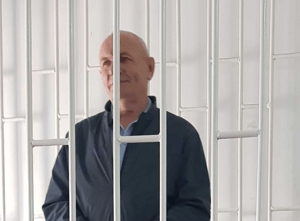Adventist Church Banned — Labeled as ‘Extremist’

Akmat Alagushev is defending the banned Adventist Church.
Txt: Mushfig Bayram, Forum 18 and Stefanus Alliance
Only four people were reportedly present when the Alamudun District Court banned the True and Free Adventist Church, labeling it “extremist.” The verdict was handed down on 19 March. The congregation was informed of the ban two days later—by then, it had already come into effect.
The four present in court were Judge Ayke Musayeva, her clerk, the prosecutor, and an officer from the NSC (National Security Committee).
The lawyer for the Seventh-day Adventists in Kyrgyzstan, Akmat Alagushev, is preparing an appeal to the Supreme Court. The ban was based on “expert analyses” commissioned by the NSC of books confiscated during raids. According to religion researcher Indira Aslanova, the analyses did not meet “basic scientific standards.”
The church’s pastor, Pavel Shreider, is also on trial. He faces up to seven years in prison. He is charged with “inciting racial, ethnic, national, religious, or regional enmity”—charges he firmly denies.
The trial is taking place at a court in the capital, Bishkek. The next hearing is scheduled for 5 June. Shreider was arrested in November 2024 and tortured during interrogation. However, his complaint about the torture was dismissed by the National Centre for the Prevention of Torture.
This is happening in one of several countries where freedom of religion is being increasingly restricted—and where more and more people are branded as extremists simply for engaging in peaceful religious activities.

Adventist pastor Pavel Shreider faces up to seven years in prison. Photo: Vera Schreider
“They Criticize Islam”
While Pastor Shreider has been in prison awaiting trial, his congregation was banned in a court hearing that the church was not even present for.
When asked what constituted “extremism” in the Seventh-day Adventist church’s doctrine or practice, Judge Musayeva responded: “Haven’t you read our conclusions in the verdict?”
When Forum 18 replied that they had read the ruling and found no extremist elements, she said: “They elevate their religion above others. They incite religious hatred when they criticize Islam or other religions.”
“Expert Analyses”
The ban was based on four “expert analyses” of the church’s literature, commissioned by the NSC. Prosecutor Muratbek Japarov stated that he supported the NSC’s investigation after reviewing the analyses and witness statements. When Forum 18 pointed out that the analyses showed no incitement to violate others’ human rights, he replied: “I’m just one representative of the authorities. You must speak with the NSC and the court.”
Medina Tokonova, one of the two Justice Ministry experts who authored the analyses, claimed she had correctly assessed the church’s teachings as “extremist.” But she refused to answer further questions without permission from the NSC.
“Absurd Charges”
Religious scholar Indira Aslanova of the Center for Religious Studies in Bishkek called the charges against the church “absurd.” She said the analyses failed to meet scientific standards, lacked methodology, violated scholarly principles, and were declarative without sufficient factual basis.
A Russian religion researcher, Oksana Kuropatkina, engaged by the church’s lawyer, voiced similar concerns. She described the analyses as “sloppily written, with serious breaches of scientific method,” and found no incitement to violence or discrimination. What they contained was interreligious polemic.
Ahmadiyya Community Banned
Ahmadiyya Muslims have been unable to gather publicly since July 2011, after the NSC labeled them a “dangerous movement contrary to traditional Islam.”
“We don’t meet publicly or privately for worship,” members told Forum 18 anonymously on 20 May 2025.
Falun Gong was registered in 2004, but under pressure from China was dissolved as “extremist” in 2005. A new registration in January 2018 was revoked as early as March the same year.
Attempts to Ban Jehovah’s Witnesses Failed
In December 2019, the NSC opened a criminal case against unnamed representatives of the Jehovah’s Witnesses’ national center in Bishkek for inciting hatred. In 2021, NSC chief Kamchybek Tashiyev asked the Prosecutor General to ban Jehovah’s Witness literature and consider banning the entire organization. A lawsuit in November 2021 to prohibit 13 books and 6 videos was dismissed on technical grounds.
Jehovah’s Witnesses told Forum 18 on 20 May 2025 that they do not know whether the case is still open. Forum 18 contacted the Prosecutor General’s Office in writing, but had received no reply as of 30 May.
Crackdown on Religious Freedom
Kyrgyzstan was once considered the least closed and strict country in Central Asia. But in recent years, the country has tightened its religion law. Freedom of religion and related human rights are under growing pressure. This crackdown coincides with Kyrgyzstan’s increasing role as a transit hub for trade circumventing sanctions against Russia following its full-scale invasion of Ukraine in 2022. Kyrgyzstan is one of the Russia-aligned nations whose geopolitical influence has grown since 2022.
The crackdown affects both Muslims and Protestant Christians.
Abuse of Extremism Laws
Kyrgyzstan is also one of the countries that defines extremism extremely broadly and uses extremism charges to ban organizations and religious communities, and to punish individuals, without links to violence or incitement. According to the U.S. Commission on International Religious Freedom (USCIRF), five countries misuse extremism laws to criminalize religious activities that regimes disapprove of.